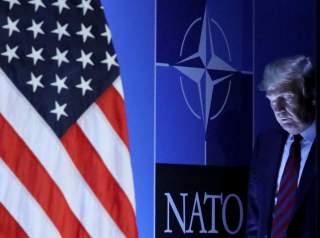NATO: The Greatest Bargain America Ever Got
NATO keeps European powers in check and saves Washington from having to balance against them. What's better than that?
“But can America ever stop them from being cheap about it?” Without NATO, America would have an even harder time stopping that. NATO makes itself available to Washington to put pressures on them to be less cheap. That's why it adopted a (non-binding) guideline that they should spend 2 percent of GDP on defense. If the United States wants to stop all cheapness among allies, there's only one way to get it done: unite them with America in a joint country. That's the solution Americans found when burden sharing was proving a disastrous problem among its own states in the Revolutionary War. America’s 1787 Federal Constitution finally solved that problem, by giving the federal government the power to tax each American state all for the joint burdens. That's the only way to get consistent, reliable burden sharing.
“Could America and its allies do that with NATO too? Could the United States turn it into an Atlantic Union and get full, consistent burden sharing?” Sure, if American actually wanted to, they probably could. But Americans don't want to. Just try running it past the U.S. Congress.
“So what, then, should Trump have done at the NATO summit?”
First, he did the main things right. He kept up the pressure on burden sharing. He offered wholesale tariff-free trade. And he called German chancellor Angela Merkel out, very truthfully despite his exaggerated wording, for her duplicity on Russia.
As to how to proceed on this, he needs to show more awareness of several of the components of these main things:
1. Show that America means it on free and fair trade. Revive the TTIP negotiations on a trade and investment pact.
2. The $350 billion the allies add to American defense annually should be made more effective, not just increased numerically. This means more spending on equipment—such as more advanced and the more often American stuff—and more (not less) on joint training with America in NATO.
3. The allies should use their forces more in supporting America’s actual fighting around the world. That's what real military burden sharing means.
4. Take the best deal Washington can get on burden sharing. Keep the criticisms valid. Mix the criticisms with victory laps. Use rational threats, not threats that the United States would be hurting itself to implement.
5. If Trump wants to do more and get to something like full-scale, enforced burden sharing, then propose an Atlantic Union. But if Washington doesn’t want this, then be sure to know the limits of what America can get in the way of making other sovereign countries foot the bills.
6. Stop talking down NATO. Trump should direct his verbal counterpunches at those who say bad things about him when they're talking to the press, not at the alliance itself.
The media keep telling Merkel and Theresa May and Justin Trudeau and the others that they must deliver this and that hostile message to Trump. Some of them are weak and keep assuring the media and their parliaments that they're delivering “the message.” They're doing their virtue signalling. So Trump should punch back at them; he’s good at it.
But don't make the rest of the alliance pay for it. Trump should keep his eyes on the prize. Merkel isn't Germany, and Germany isn't Europe or NATO. Merkel is at this point a failing politician. Her preening to the media makes her the opposite of Kohl. Helmut Kohl had faced constant media ridicule. He always found the courage to face it down. He was the real Germany. He was the best ally of President Reagan, who was also ridiculed shamelessly by the media.
7. Remember that when dealing in NATO America is dealing with family quarrels, which can be the most frank but have to stay family. Adversaries are diplomatic but the negotiation is —adversarial. With Putin, America is negotiating with an adversary. It shouldn't have turned out that way with Russia after 1991 and Trump is right in wanting to reverse that outcome, but for now America has to deal with the reality of it if it is to find its path to changing it.
8. The media, despite speaking in the name of NATO, are in fact encouraging the allies to divide NATO against Trump. He shouldn’t make it easier for them. They accuse Trump of liking Putin more than NATO. Trump should remember the reason he gave during the campaign as to why he'll be a better President than Obama: that unlike him, Trump will be harder on our enemies than on our friends.
When Trump meets with Putin and the press in Helsinki, he better make sure to talk up how he has NATO's back and how NATO has his back.
Dr. Straus is U.S. Coordinator of the Committee on Eastern Europe and Russia in NATO, and is Chair of the Center for War/Peace Studies; has been Secretary of the Committee for an Effective Alliance and Executive Director of the Association to Unite the Democracies; and has taught international relations at several universities. The views expressed in this piece are the responsibility solely of the author.
Image: U.S. President Donald Trump arrives to hold a news conference after participating in the NATO Summit in Brussels, Belgium July 12, 2018. REUTERS/Reinhard Krause TPX IMAGES OF THE DAY

